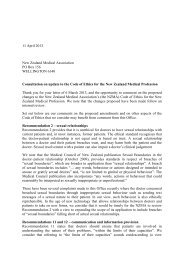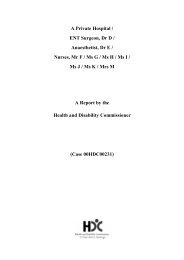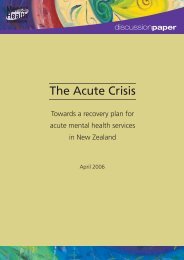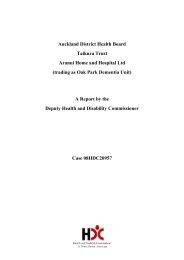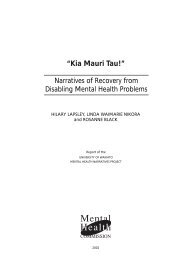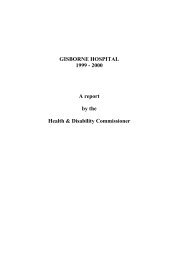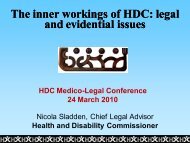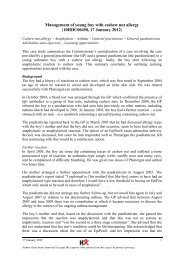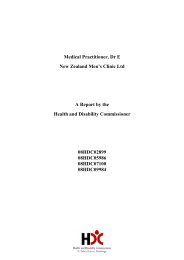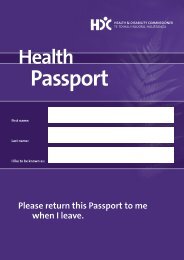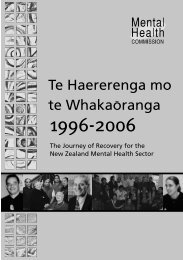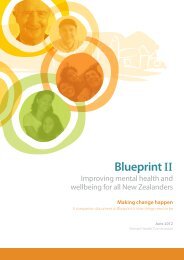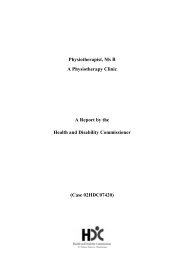09HDC01565 - Health and Disability Commissioner
09HDC01565 - Health and Disability Commissioner
09HDC01565 - Health and Disability Commissioner
Create successful ePaper yourself
Turn your PDF publications into a flip-book with our unique Google optimized e-Paper software.
<strong>Health</strong> <strong>and</strong> <strong>Disability</strong> <strong>Commissioner</strong><br />
Appendix 2 — Independent advice — Nursing care<br />
The following expert advice was obtained from Janet Hewson, prior to the start of the<br />
formal investigation into the care provided by RN Ms I, RN Ms J <strong>and</strong> RN Ms K.<br />
―I have read <strong>and</strong> agree to follow the Guidelines for Independent Advisors.<br />
I am a registered nurse with a master‘s degree. I have been working full time as a<br />
nursing clinician <strong>and</strong> educator for over 40 years. My main practice area has been<br />
acute care of the adult. Presently I am the clinical coordinator of a 41 bed surgical<br />
ward. I regularly teach at a post graduate level (advanced health assessment) <strong>and</strong> hold<br />
a Level 6 instructor certificate with the NZ Resuscitation Council. I have been<br />
assessed as an expert practitioner by the Nursing Council of New Zeal<strong>and</strong> (NCNZ)<br />
professional development programme.<br />
I have been asked by the <strong>Commissioner</strong> to give nursing advice in the case of [Mr A],<br />
reference number <strong>09HDC01565</strong>.<br />
BACKGROUND<br />
[Summary of events omitted for brevity]<br />
SUPPORTING INFORMATION<br />
[List of documents reviewed omitted for brevity]<br />
EXPERT ADVICE<br />
i. The st<strong>and</strong>ard of nursing care for [Mr A] at [the] Hospital from [Day 1-3].<br />
[Mr A] was placed in the Special Care Unit (SCU) to ensure he received a higher<br />
level of nursing care. A higher level of nursing care means the nurses in the unit are<br />
skilful <strong>and</strong> knowledgeable in the care of patients whose condition may change<br />
suddenly or slowly over a period of hours. For this reason, the most significant<br />
competency the nurse will have is that of surveillance. Regular, purposeful looking at<br />
your patient <strong>and</strong> watching for signs <strong>and</strong> symptoms of change are the hallmark of<br />
nursing practice in a SCU. In order to provide surveillance, the layout of the unit, the<br />
monitoring equipment, the timing of data collection, the essential data to be collected<br />
<strong>and</strong> the prioritizing of work are all factors to be considered.<br />
In this case, the evidence I have been provided shows that:<br />
[Mr A] was not visible to the nurses at all times as his curtain was drawn.<br />
Monitoring equipment was only used when the set of observations were due<br />
(e.g. Sp02)<br />
The respiratory rate (RR) parameter was never documented <strong>and</strong> by all<br />
statements, never specifically counted.<br />
Nurses did not give h<strong>and</strong>over in the unit.<br />
Observations were 2 hourly, however not taken at 0700.<br />
The on-going <strong>and</strong> off-going nurses did not see the patients together after<br />
report.<br />
5 September 2012 56<br />
Names have been removed (except Canterbury DHB <strong>and</strong> the experts who advised on this case) to<br />
protect privacy. Identifying letters are assigned in alphabetical order <strong>and</strong> bear no relationship to the<br />
person’s actual name.



